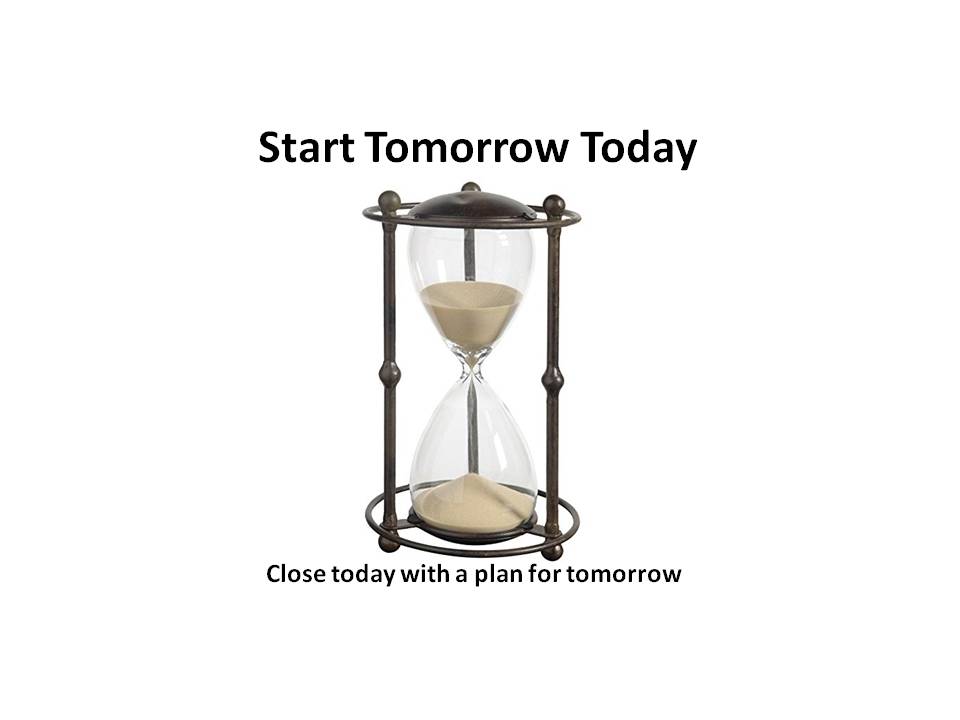Start Tomorrow Today
 Effective leaders in healthcare, and across corporate America, are known for being very busy and efficient using effective schedules. Those who make it to the top leadership positions may appear to have everything under control as they progress through massive schedules. Although top executives have a support staff to help them maneuver through the day, their ability to navigate the workload goes beyond a skillful staff. CEOs have learned early in the game to establish a daily routine and weave it into it an agenda that the support team helps bring to life. An important component of the daily schedule is the end of day routine where the leader closes today and plans for a productive tomorrow.
Effective leaders in healthcare, and across corporate America, are known for being very busy and efficient using effective schedules. Those who make it to the top leadership positions may appear to have everything under control as they progress through massive schedules. Although top executives have a support staff to help them maneuver through the day, their ability to navigate the workload goes beyond a skillful staff. CEOs have learned early in the game to establish a daily routine and weave it into it an agenda that the support team helps bring to life. An important component of the daily schedule is the end of day routine where the leader closes today and plans for a productive tomorrow.
Healthcare leaders work in an especially chaotic environment and by the end of the day it is tempting to pack up and leave. But if you skip out the door too quickly, you will deny yourself the opportunity to grow as a leader. The end of the day is a special time for you to reflect on the successes and challenges of the day, and to prepare for tomorrow. Leaders at any level will benefit by following these examples for routine and reflection.
• Block the last slot on your calendar for your shut down routine.
• Clean the clutter from your desk and your computer. Remove scrap paper and throw away everything that you do not absolutely need to keep. When in doubt, throw it out. Close any open files on your computer and reply ONLY to urgent email. Caution: Do not sacrifice your EOD routine by browsing through email and social media.
• Review the tasks on today’s to-do list and assess your effectiveness in bringing things to closure. Assess whether or not you were successful in completing your top priorities and determine which items to move to tomorrow’s to-do list.
• Close your eyes and visualize your biggest challenge. Relax and ask yourself WHAT questions such as, “What are other resources that I have not used?” “What if I re-prioritized my to-do list?” or “What piece of information is needed to allow the project to move forward?” Writing in the British J. of Psychology, Wieth and Zacks note that your brain is most creative when it is groggiest. Relaxing you tired brain and thinking through your upcoming challenges may give you insight that will solve tomorrow’s problem.
• Thank someone for their contribution to your personal success or the success of the team. Regularly recognizing others puts you and someone else in a positive frame of mind. In addition to showing thankfulness, sometimes offering forgiveness is important and appropriate.
• Review both your schedule for tomorrow as well as your to-do list. Make sure that your list reflects your priorities and that you have adequate resources to complete your list.
• Leave work at work and go home. On occasion you may need to finish something at home but routinely extending your work day into the evening will cause burnout and actually detract from your effectiveness.
Place value on your own after-work activities and develop the routine that works for you. To end my day with an established routine after leading a team of 110 healthcare workers, I created CROTE. Clean, Reflect, Organize Thank, Exit.
